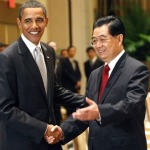China and America can Forge an Energy Partnership

Chinese President Hu Jintao's state visit has raised the usual narrative about the numerous ways in which the U.S. and China annoy each other.
One is energy. Anxiety over China's near-monopoly over production of rare earth minerals used in many energy technologies and a WTO row over Beijing's support for the home team's wind energy companies are two flies in the bilateral energy ointment.
There is more to the U.S.-China energy relationship, however, than pot vs. kettle dust-ups over technology subsidies.
While transpacific tensions are real, the world's two energy elephants have substantial reasons to team up in order to diversify and modernize their energy menus.
Neither will be secure as long as their economies are dependent on a thin black line of tankers ferrying oil from the world's most dangerous region.
Nor does either have an interest in emitting carbon into the atmosphere with abandon and letting climate change spin out of control. In both countries, the snow and ice that serve as free water storage reservoirs for cities and farms are at risk from the additional heat energy in the atmosphere.
Those are high-profile strategic issues. Jon Huntsman, the U.S. ambassador to China who has been the subject of intriguing political speculation lately, brought the importance of energy cooperation down to the kitchen table at a Brookings Institution forum on Tuesday.
"When people ask me why we should cooperate with China on clean energy initiatives, I say it’s very simple: We are embarking on a technological revolution in clean energy, like the space program or electronics of the 20th century, that will dramatically expand high-quality jobs, living standards, and our economy in the United States."
For example - ever heard of a traveling wave reactor? That's a nuclear powered technology that the hard-headed software geek, global philanthropist and new energy maven Bill Gates believes could drive away all five of the party poopers impeding robust expansion of zero-oil, zero-carbon nuclear power – cost, fuel, proliferation, safety, and waste.
What's U.S.-China energy cooperation got to do with riding the traveling wave? In China, where the power plant approval process is, shall we say, more streamlined than in the U.S., Huntsman said the two countries could work together on demonstrating the technology, driving down costs and getting it ready for commercial debut more quickly than would be the case if they acted separately.
U.S. companies are seeing a business advantage in cutting deals with Chinese counterparts to push new technologies – e.g. the utilities Duke Energy and China Huaneng Group agreed in 2009 to cooperate on developing coal gasification and renewable energy.
The U.S.-China Clean Energy Research Center is putting the heads of American and Chinese experts together to address three other sets of energy R&D questions that matter to both countries: energy efficiency to drive down the costs of buildings, electric cars to loosen the OPEC apron strings, and carbon capture and sequestration to clean up coal's act and enable safe use of the abundant coal reserves under U.S. and Chinese soil.
The many irritants in the U.S.-China relationship – trade and Tibet, currency and Korea, to name a few – can't be wished away. Energy cooperation, however, is in both countries' interests, and could apply a bit of balm to the world's most important bilateral relationship.